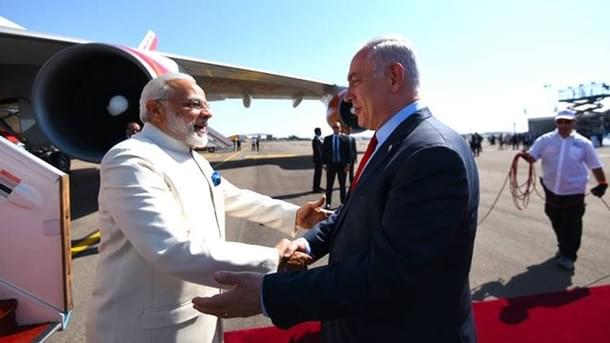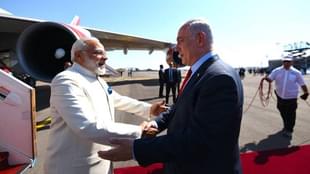World
Why The India-Israel Emotional Connect Is Unnerving Our ‘Secular Liberals’
R Jagannathan
Jul 06, 2017, 12:06 PM | Updated 12:01 PM IST
Save & read from anywhere!
Bookmark stories for easy access on any device or the Swarajya app.


The genuinely positive emotions and feelings generated by Prime Minister Narendra Modi’s trip to Israel, the first by any Indian PM in 70 years, appears to have unnerved card-carrying secularists. Whether it was the warmth with which Israeli Prime Minister Benjamin Netanyahu embraced Modi, or the high billing the visit received in the local media, few could miss the emotional underpinnings of a relationship that has thus far been held hostage to domestic minority politics and fears about the jobs of Indians working in the Gulf.
If the positivity was palpable, so was the consternation of the ‘secularati’. Congress leader Shashi Tharoor, who, while conceding the importance of the India-Israel relationship, immediately hyphenated it with Palestine. He hoped that Modi’s visit will not come “at the expense of our traditional loyalty and ties with Palestinians and the Palestinian cause”.
One wonders what joy our regular espousal of the Palestinian cause, however genuine it may be, has brought India in the past.
Tharoor’s party, the clueless Congress, demanded to know what benefit the Israeli partnership would bring, since Modi’s various foreign trips allegedly did not help the country much. One wonders whether the Congress leadership thinks diplomacy is all about an instant exchange of benefits for handshakes.
The Left’s reaction can be ignored, for it had opposed the visit as far back as 2015, when the idea of Modi visiting Israel was first mentioned.
But of great interest is the commentary by Left-leaning publications on the visit. It was uniformly in the “okay, but” mode. A relationship with Israel is a necessary evil, but it cannot be trusted.
The Wire, a digital publication, dissed the idea with two critical pieces, one explaining how the three-way India-Israel-Palestine equation does not make sense, and another wondering aloud about the bond between Netanyahu and Modi. The article speculated the bond is their “shared susceptibility to myths of national glory”, and wandered off into Modi’s fantasies about “Ganesha being evidence that advanced surgical transplants were done in ancient India”. One wonders what this had to do with the Israel trip.
Scroll.in, another online publication, had several articles casting doubts on the relationship. While one warned against the “true price tags” of military deals with Israel, another claimed that it was the “threat of religious conservatism” that united India and Israel. A third article was more neutral, and based the relationship on pragmatism, but warned that it should not be seen as a romance. It’s typical Bollywood stuff, where the parents of both lovers frown at the budding relationship.
On twitter, one journo mentioned the late General Zia ul-Haq’s statement on Pakistan being like Israel, and Asaduddin Owaisi, India’s budding mini-Jinnah, who hopes to emerge as head of a unified Muslim leadership, enthusiastically embraced the comparison. Owaisi tweeted: “Absolutely right. Israel cannot be an ideal for India, as Israel is for Zionist(s) & Pakistan for Muslims only. India’s identity is its diversity.”
Gen Zia ul-Haq’s actual quote, attributed to an interview to The Economist in 1981, ran something like this: “Pakistan is like Israel, an ideological state. Take out the Judaism from Israel and its will fall like a house of cards. Take Islam out of Pakistan and make it a secular state, and it would collapse.”
The problem with both Zia ul-Haq’s and Owaisi’s understanding of the Israel-Pakistan comparison is that it is shallow.
The outward similarities are clear: one is a Jewish state, another an Islamic one. But the similarities end here.
Israel is a democracy; Pakistan is an army with a state to run. It is a feudal state, where a cabal of army generals and Islamists call the shots.
Israel, despite its formal declaration as a Jewish state, protects its minorities. Pakistan has oppressed and driven out most of its minorities. It is host to every possible jihadi organisation in the world, from Al Qaeda to Islamic State to the Taliban, not to speak of assorted terrorist organisations targeted at Afghanistan or India.
Third, Israel was created after the Holocaust, when the world’s Jews discovered that they had no nation to call their own. Pakistan was created by Muslims in India who already had a home. They didn’t want to live in a country whose majority population was Hindu. The idea of Pakistan was hatched in Uttar Pradesh, but finally took shape only in the Muslim majority areas of West Pakistan, and East Pakistan, later Bangladesh, as Venkat Dhulipala demonstrates in his book Creating a New Medina.
Fourth, the idea of Pakistan is anti-India; the idea of Israel is to provide a safe haven to persecuted Jews all over the world. There was no place Jews could call their own before Israel came into being; well before Pakistan came into existence, there were scores of Muslims states, most of them Islamic by choice. The idea of Pakistan is thus essentially communal and anti-secular. The idea of Israel is not.
Fifth, the aim of Israel’s enemies is to push it into the sea; the aim of Pakistan is to not only break up India, but provide human cannon fodder and ideological support to the world’s worst Islamist organisations. The idea of Israel comes from a positive self-definition; the idea of Pakistan comes from a negative self-definition of being anti-something or the other (India, the West, etc).
Owaisi and his secularist cohorts may be keen to delegitimise the India-Israel partnership by lumping Israel with Pakistan, but the comparison sucks.
The real thing is this: Indians (or the Indians who do not consider themselves rabidly Muslim) have a genuine affinity to Israel precisely because of the Islamist threats facing both. And Hindus, who form the bulk of India, find in Judaism a mirror of their own non-proselytising beliefs. Aggressive conversion activities willy-nilly change the political status quo, destabilise relationships between people and add an element of disunity to an already divided world.
Jagannathan is former Editorial Director, Swarajya. He tweets at @TheJaggi.





